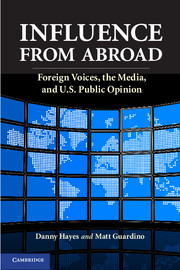4 - When Foreign Voices Persuade
Predispositions, Partisanship, and International Influence on U.S. Public Opinion
Published online by Cambridge University Press: 05 April 2013
Summary
As the Bush administration continued its push for military action during the winter of 2002–2003, many ordinary Americans remained unconvinced of the necessity, wisdom, and morality of a war against Iraq. Among their chief reasons for skepticism was the evident lack of broad endorsement from foreign governments and international organizations. A patron in an Atlanta barbershop told ABC News in January 2003 that he was opposed to a unilateral U.S. strike: “Not without everybody’s support,” he said. “I’d like to leave it up to the United Nations to decide instead of Bush.” For this man and others like him, international backing would have lent military action a legitimacy that it otherwise lacked. Contrary to many academic and popular views of the U.S. public as uninterested in – or even hostile toward – overseas perspectives on foreign policy, a significant number of ordinary Americans expressed opposition to war with Iraq even in a political environment suffused with displays of militaristic patriotism and devoid of significant mainstream domestic elite criticism of the Bush administration.
Whereas general uneasiness with the idea of preemptive and unilateral U.S. military action was not uncommon among Democratic and independent citizens in 2002, this skepticism required a trigger to become activated in the specific context of the potential invasion of Iraq: people’s basic values are unlikely to be reflected in their opinions about specific policy proposals unless they receive information and arguments from credible sources that connect those general predispositions to the particular issue under discussion (Zaller 1992). In Chapter 2, we demonstrated that, during the months before U.S. troops began the fateful assault on Baghdad, these arguments came primarily from the leaders of foreign governments and officials from international organizations who appeared regularly in mainstream media as foils to the Bush administration’s relentless push for military action. In this chapter, we build on that analysis of news coverage to offer the first empirical demonstration of foreign elite effects on mass U.S. public opinion. Such criticism from overseas cannot simply fill the important democratic role that domestic elite opposition to war can play.
- Type
- Chapter
- Information
- Influence from AbroadForeign Voices, the Media, and U.S. Public Opinion, pp. 85 - 128Publisher: Cambridge University PressPrint publication year: 2013

